Welcome back to the Stairway to Wisdom!
If I may say so myself, there are some excellent books featured in the newsletter today, and the latest breakdown will hopefully have you thinking about the emotion of regret in entirely new, empowering ways.
I've recently posted a new YouTube video about a book written by the man who left a $275,000,000 fortune to charity after he died, which you can watch right here.
The Charity Reading Challenge also continues in November and we're raising money for the children's education charity First Book, so head here if you want to read for a good cause!
And this week's book breakdown features The Power of Regret, by Daniel H. Pink, where he makes a case for our most misunderstood emotion, and how we can transform it into something extremely valuable that can help us live better.
In this issue of the newsletter, we've also got a profile on the brilliant writer Ursula K. Le Guin (she's one of my favorites), three books that will help you survive (and thrive) during a recession, wisdom from an extremely valuable book about building a powerful professional network, and more!
So let's get started!
Latest Release: The Power of Regret
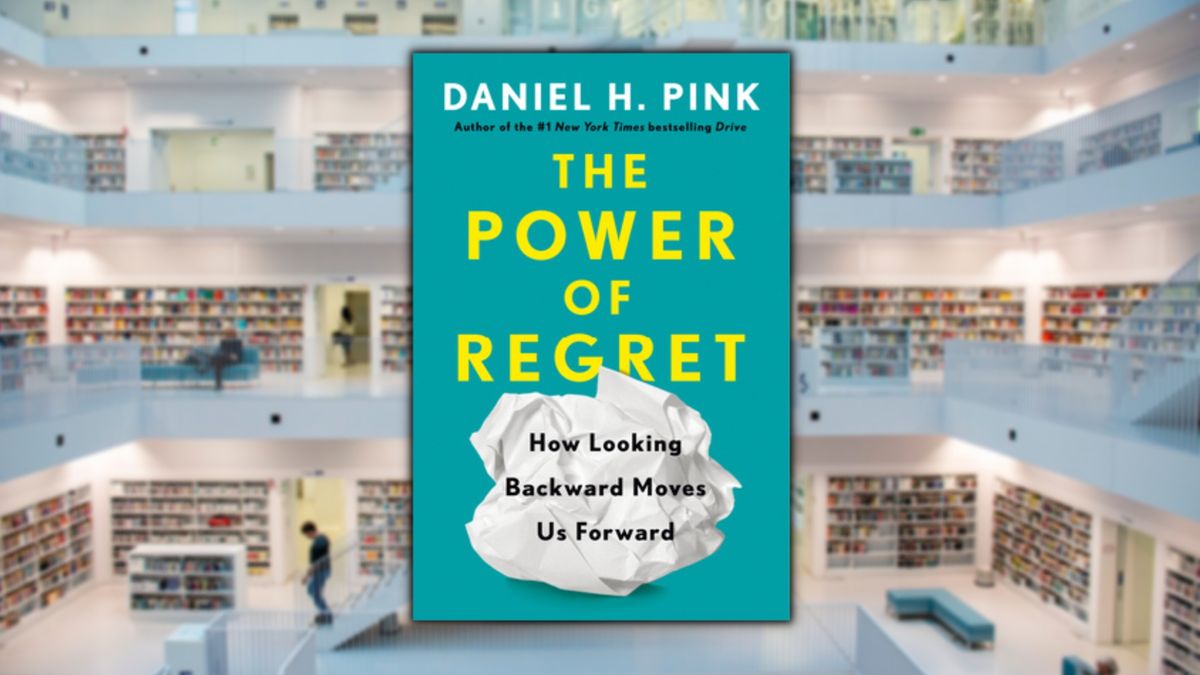
"Regret is not dangerous or abnormal, a deviation from the steady path to happiness. It is healthy and universal, an integral part of being human. Regret is also valuable. It clarifies. It instructs. Done right, it needn't drag us down; it can lift us up."
-Daniel H. Pink, The Power of Regret
It's more or less a universal human experience to look back on the path we never followed and feel a nagging, painful, sometimes sinking, sickening feeling that we've somehow missed our chance, that we've traded our many unlived lives for this one, real life, and that it could have been so much better had we simply acted differently.
Virtually everyone has experienced something to the same effect, ranging from the "that might have been nice," to the "damn, I really should have done that," all the way to the "I've thrown it all away and I'll never, ever recover from this."
Anyone who says that they have no regrets is also usually viewed with suspicion by most people who have taken the time to reflect on their own personal history.
In this book, The Power of Regret, Daniel Pink refers to regret as our most misunderstood emotion and shows how it can potentially be transformed, transmuted into something extraordinarily valuable. We can reflect on our regret, reorganize it in our minds, reconceptualize it, and then use it to live better with all the time we have left.
What's more, navigating regret (and life) is always an ongoing process of closing certain opportunities while at the same time opening new ones. Every action we take determines the possibilities that are available to us in the next moment, and we are always choosing, even when we do nothing.
But we are not helpless against regret, as Daniel Pink argues in this book. We can enlist this misunderstood, potentially painful emotion in service of living a larger life, gaining redemption, and reclaiming at least a portion of our remaining unlived lives.
--> Read the rest at the Stairway to Wisdom!
Inside the Mind: Ursula K. Le Guin

Inside the Mind is where we take you deeper into the life and thought of a major literary figure, someone who has had an extraordinary impact on our collective knowledge and wisdom.
Today I'm featuring Ursula K. Le Guin (1929-2018), a brilliant author of 23 novels, 12 volumes of short stories, 11 volumes of poetry, and more. She's won six Nebula Awards and seven Hugo Awards...just on and on. She was incredibly talented and hardworking and was beloved by readers the world over - including me!
I think of her as a science fiction writer, but her nonfiction is also just wonderful, and she's got a book on writing, called Steering the Craft, that I really enjoyed. She'd probably want me to find a different word than "really" to use in that descriptive sentence, but here we are.
Anyway, below are three quotes from Ursula, but I'd also like to point out that she also took great pains to ensure that her prose would read beautifully when read aloud. Try it with the opening of her book, The Lathe of Heaven! I think you'll see what I mean.
A Few Quotes from Ursula K. Le Guin:
“A writer is a person who cares what words mean, what they say, how they say it. Writers know words are their way towards truth and freedom, and so they use them with care, with thought, with fear, with delight. By using words well they strengthen their souls.
Story-tellers and poets spend their lives learning that skill and art of using words well. And their words make the souls of their readers stronger, brighter, deeper.”
“Love doesn't just sit there, like a stone, it has to be made, like bread; remade all the time, made new.”
“We're each of us alone, to be sure. What can you do but hold your hand out in the dark?”
Start with this Book - The Lathe of Heaven, by Ursula K. Le Guin
Another Good Place to Start: A Wizard of Earthsea, by Ursula K. Le Guin
Wisdom in Action: Never Eat Alone
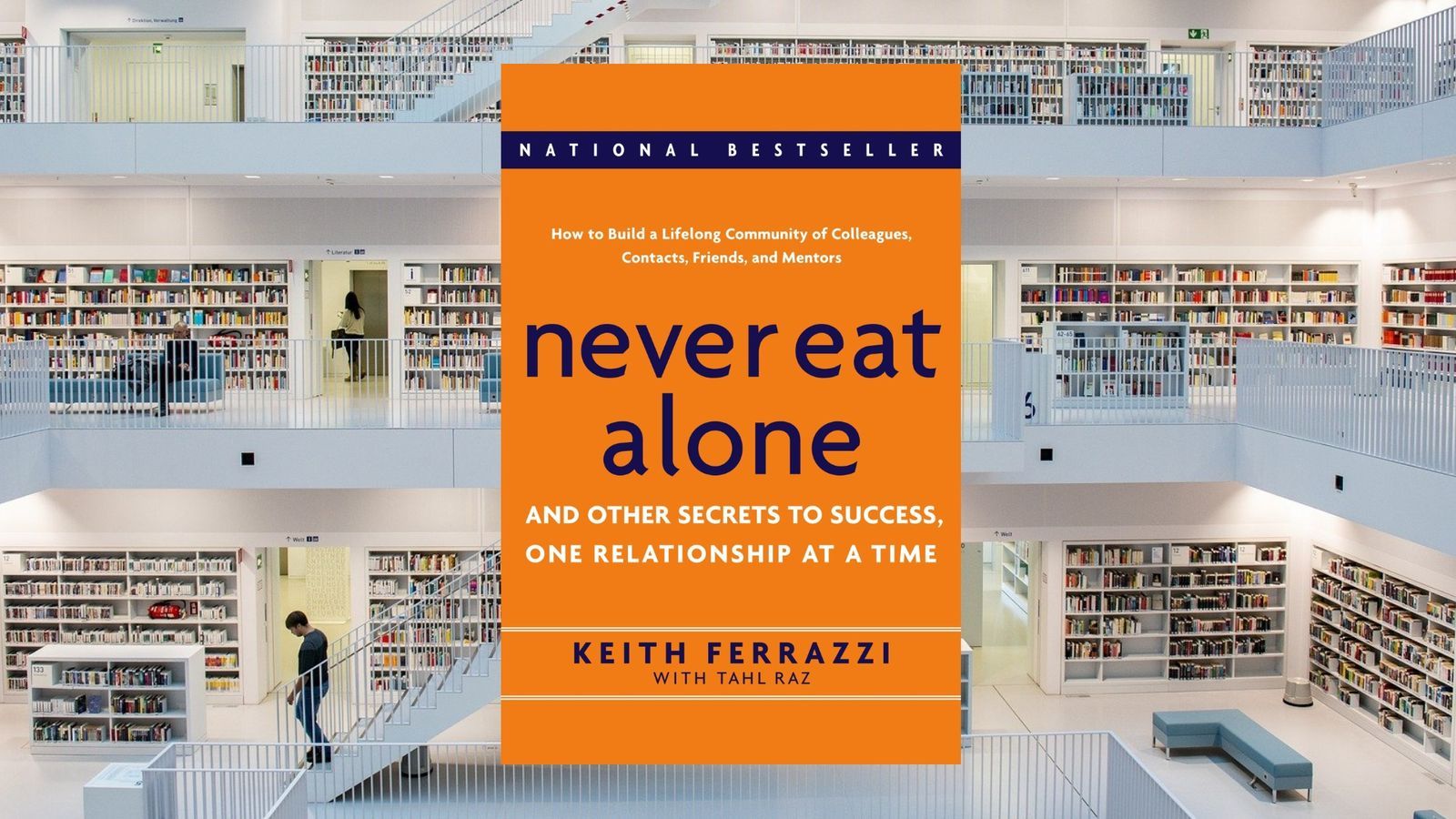
You'll notice that every book summary in The Stairway to Wisdom comes with Action Steps. That's because when you really want to bring about changes in your life, knowledge is not enough.
After learning and knowing, you must do.
We want every one of our readers to see and feel their lives changing for the better, immediately and over time.
So in this section, we've taken the first three Action Steps from Never Eat Alone, one of the best business books out there about building a powerful network, and put them right in front of you so that you can take action today:
#1: Find Your Whos
For every What that you want to accomplish, there's a Who that can help you get there faster.
In Never Eat Alone Ferrazzi explains the importance of having four different types of people in your network: people who can help you to meet your goals, mentors, super-connectors (people who know lots of people), and prominent people, i.e. leaders in their organization.
You need to write out a list of who these people are so that you can contact them, connect with them, find out what they need and how you can help provide it, and begin to strengthen your relationship over time.
This step doesn't have to take a long time, and it's best not to overload yourself with options when you're just getting started reaching out. To help you decide who should populate your list, proceed to Action Step #2.
#2: Create a Relationship Action Plan
Great relationships don't form by themselves. You have to be intentional about the process, and you need to have a plan. Now, this doesn't have to be - and shouldn't be - some calculated, conniving, sinister plan for success at all costs; quite the contrary, as we've discussed throughout this entire breakdown!
It's just that networks rarely form by accident, and you need to take your own future prospects into your own hands. That's where your Relationship Action plan comes in.
When you're trying to figure out who you want or need to network with in order to make big things happen, it's helpful to look at it through the lens of your goals: in the short-term, the mid-term, and the long-term.
I find it helpful to work backward from your long-term goal, something that, for most people would take about 5-10 years. Not to complicate things, but I also like to have really, really long-term goals for my life made up of things I want to achieve in the next 50-100 years (seriously), but you don't have to worry about that right now. That's a conversation for another time!
For the purposes of this Action Step, simply write down a goal you'd like to achieve within the next 5-10 years. That's your long-term goal.
Next, write down at least one mid-term goal that will help you achieve your long-term goal. It should be something that you can accomplish in the next year.
Then what you'll do is write down at least one short-term goal that you can accomplish within the next three months and that will move you closer to achieving your mid-term goal above.
Your job now becomes identifying who can help you achieve these goals, what they can do for you, why they would want to help you in the first place, and what you can do to get on their radar.
#3: Perfect the Art of Following Up
The luxury real estate agent Ryan Serhant often says, "Til death do I follow up." It's important. Following up with your list of contacts makes them feel appreciated and helps to remind them that you exist, but it also shows them that you're serious about connecting.
People are busy. Even though they may be perfectly nice people, they're probably not thinking about you. They're thinking of their own goals, problems, opportunities, etc. People will forget about you over time if you don't make a habit of consistently following up and staying in touch.
I mean, after all, doesn't the same thing apply to your closest friendships? If you didn't stay in touch with your friends, those relationships would wither and fade away. It's exactly the same with your business associates.
In Key Idea #7 of the full breakdown we likened your network to a garden and said that what you plant there will eventually bear fruit. Following up is like tending your garden; it's about keeping your hard-won network healthy and vibrant and alive.
In the next Action Step that comes after this one, we'll talk about how to do this easily, in a way that's natural and authentic, and in a way that serves everyone's interests and makes people feel good about themselves.
Read the Full Breakdown: Never Eat Alone, by Keith Ferrazzi
From the World of Reading: New Book Alert
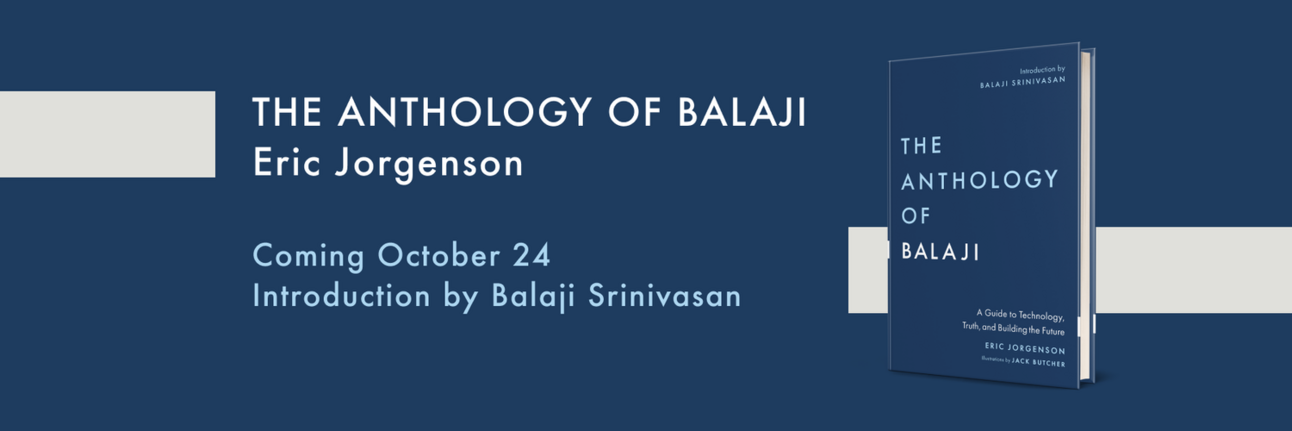
I mentioned this book a few weeks ago and told you how excited I was to read it, but I'm mentioning it again because now I've actually started reading it, and it's every bit as good as I thought it was going to be!
Eric Jorgenson is an author who, when he comes out with a new book, I just buy it, no questions asked.
I’ve written a complete breakdown of one of his earlier books, The Almanack of Naval Ravikant (highly recommend), and I’ve even read his super-short but super-valuable Career Advice for Uniquely Ambitious People.
You can also read Eric's new book online for free (same as The Almanack).
As for Balaji Srinivasan, he's an angel investor and author of The Network State, and here’s what Eric’s Anthology is all about:
"Want to sit with Balaji and spend a few hours deep in conversation to absorb all of his biggest ideas?
That’s exactly what this book feels like. It has all of the most useful and timeless ideas from tweets, podcasts, and essays across his entire career.
Balaji is a brilliant entrepreneur, investor, and futurist. Applying his unique perspective will help you see opportunities, identify breakthrough technologies, and build something tremendous.
This book is a guide to thinking for yourself, seeing possible futures, and learning how to build a piece of the future. By reading this book, you might pick the next great investment, start a billion-dollar company, or start an entirely new country."
Source: The Reading Life
Learn This Concept: The 4% Rule
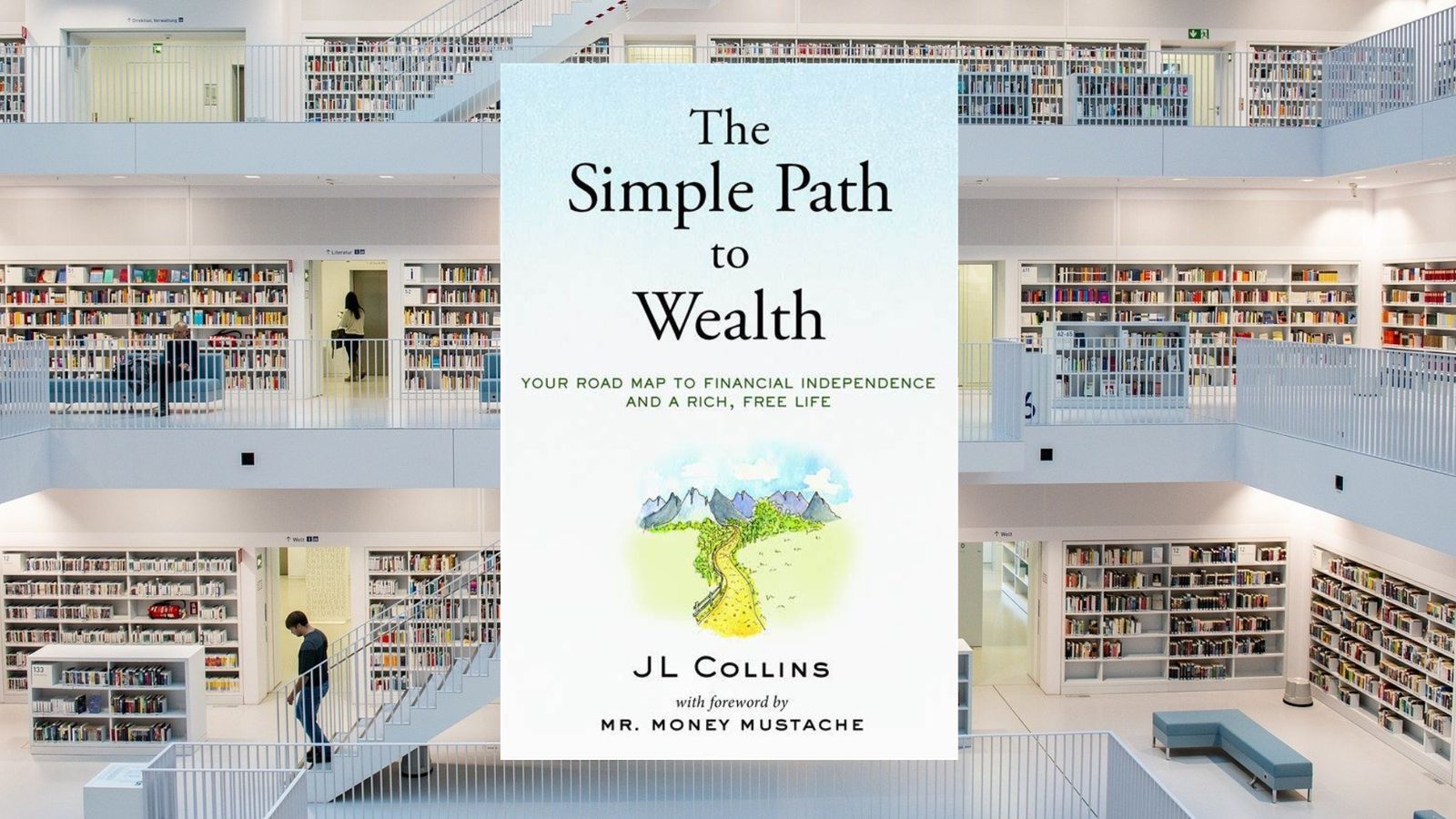
“Once 4% of your assets can cover your expenses, consider yourself financially independent. Put another way, financial independence = 25x your annual expenses.
That is, if you are living on $20,000, you have reached financial independence with $500,000 invested. If, like our friend Mike Tyson, you are living on $400,000 a month/$4.8 million a year, you’re going to need $120 million.”
If you make more than you spend, you'll always be rich. The 4% Rule has to do with calculating how much you need to have invested in order to stop working and to live off the interest that your investments generate.
Depending on who you are, your financial habits, and the basic structure of your life, your number will be different than other people's numbers. This is as it should be. Your situation will differ from mine (and from virtually everybody else's), and we all need to arrive at our own version of "enough."
In the quote above, there are a few things I'll have to expand on in order to give you more context surrounding this. First, the number 4% is based on the conservative assumption that your investments will grow at a rate of about 8% per year.
Obviously, some years in the stock market will be better or worse than others, but it's been a reliable, reproducible finding over time that withdrawing at 4% per year works for most people.
The "rule" was first developed in 1988 (and updated in 2009) by three professors who ran computer simulations to test the impact of different percentage withdrawal rates on various portfolios over a 30-year period. Over that 30-year period, the researchers found that a portfolio split 50-50 between stocks and bonds, with a 4% withdrawal rate adjusted for inflation, remained stable 96% of the time.
To make the rule more concrete, you can imagine that you've calculated your yearly living expenses to be about $100,000. That's a lot of money to some people in some places, and not very much at all to other people with different lifestyles and in different countries.
But if you multiply that number by 25, you get $2,500,000, and if you assume a 4% yearly gain, you reach $2,600,00, meaning that you can withdraw $100,000 for your living expenses without even touching the principal. That's the 4% Rule.
You can do all the calculations yourself (and I highly recommend that you do!) and you'll see that there is an actual number that you can shoot for that, once reached, will allow you to live in relative freedom and security for the rest of your natural life. This is powerful information to know!
One of the traps lying in wait for you, however, is that of lifestyle inflation, whereby your living expenses keep going up and up to match your increased income. If you fall prey to lifestyle inflation, it will never matter how much money you make, because it will never be enough.
So now you have a concrete goal, and the task ahead of you is to organize your entire financial life so that you're moving inexorably towards that goal with everything you do. As Charlie Munger said, that first $100,000 is a bitch, but you'll also have the power of compounding working in your favor too, as long as you remain focused on the goal and keep contributing to your investment account.
Obviously, nothing in life is guaranteed, and once you do reach financial independence, it's not like all your troubles will be over and you'll live in perfect bliss and total satisfaction for the rest of your life. Life is change, uncertainty, movement, and transformation. But as JL Collins says (and even he's being more careful here):
“Withdrawing 3% or less annually is as near a sure bet as anything in this life can be.”
Further Reading: The Simple Path to Wealth, by JL Collins
Three Books: How to Survive (and Thrive) During a Recession

There is a book for every problem you could ever face. Whatever it is that you're dealing with, someone else has also gone through something similar, come out stronger on the other side, and written about it in a book.
With that in mind, here are three books that can help you survive an economic recession and even come out stronger on the other side:
The Science of Money, by Brian Tracy:
“Your most valuable financial asset is your earning ability. What is your earning ability? It’s your ability to get results that people will pay you for, and the most important word for success, in life and in business, is results.”
This Book Breakdown contains 6 Key Ideas, 5 Action Steps, and 19 Book Notes. Read It Here.
The Great Rat Race Escape, by MJ DeMarco:
“If the crowd knew any better, they wouldn’t be two paychecks from broke and wasting their life in front of a television.”
This Book Breakdown contains 19 Key Ideas, 11 Action Steps, and 44 Book Notes. Read It Here.
The Almanack of Naval Ravikant, by Eric Jorgenson:
“Learn to sell. Learn to build. If you can do both, you will be unstoppable.”
This Book Breakdown contains 21 Key Ideas, 6 Action Steps, and 40 Curated Insights. Read It Here.
Upgrade Your Reading: Battle Test-Taking Anxiety

Today, I'll be sharing ultra-learning expert Scott Young's best advice on how to combat test anxiety and ace your upcoming exam. This was originally published in Scott's free newsletter, which you can check out here. Happy studying!
You know the feeling: sweaty palms, tightness in your chest and the tunnel vision that centers on the exam paper sitting in front of you. You feel like you should know the answers, but you keep forgetting. You glance at the clock and realize you’re falling behind. When the exam finishes you feel awful—you know that you knew more than what you wrote down on the page.
Why do we get test anxiety and how can we approach any exam with confidence?
In the previous two essays in this series (here and here), I’ve already pointed to a key cause: we don’t know how to study effectively.
Cognitive illusions about memory and understanding are pervasive. Often the reason we underperform on exams is because we actually aren’t learning as much as we think we are. Fixing flawed studying strategies is an essential first step.
Yet if you think anxiety makes it harder to perform well, you’re not alone. Research shows that anxiety can lower our working memory capacity by introducing distracting thoughts. This mental bandwidth is essential for cognitive performance, and is one reason why research shows a low level of general arousal is better for complex tasks.
How to Beat Back Test Anxiety
Unfortunately, it’s difficult to simply wish away our anxieties. Just because you know you’d perform better without the stress doesn’t mean you can will yourself to relax during exam time.
The good news is that there’s a remarkably effective procedure for dealing with excessive anxieties: exposure.
Neuroscientist and anxiety researcher Joseph LeDoux remarks that exposure therapy offers help for dealing with anxiety in around 70% of cases. Other researchers note that it often works as well or better than pharmaceutical interventions.
The basic idea is this: our fears are controlled by primitive evolutionary circuits in our brain. Although the exact process of forming pathological fears is not always well understood, we do have a good idea of what diminishes them. By having direct exposure to the source of your fears, in an environment that is safe, you can reduce their severity.
 |
This means for test anxiety, there are a few key steps you can take to feel calm on exam day:
- Do practice tests under real-time pressure. This not only provides exposure, but is also a highly effective studying technique.
- If possible, do practice tests in the actual testing room. Exposing yourself to the real context makes the transfer of the learned behavior more likely.
- Visualize the test experience. When realistic exposure isn’t possible, say because there are no practice tests or because the testing environment is inaccessible, visualization can also help.
Preparing Your Mind (and Emotions) for Learning
Learning well ultimately isn’t just about cognitive tricks for memory and practice. It’s about managing your emotions: staying calm, focused and even excited about learning.
However, just as there are cognitive illusions for what works when studying, we have emotional illusions about how to self-regulate our reactions to stress and difficulty. Instead of facing realistic simulations of our fears, we engage in obsessive behaviors to try to neutralize the stressor mentally. These safety behaviors, however, can actually make the anxiety worse!
By applying effective, research-based techniques, we can make learning more successful and stress-free.
Further Reading: Scott Young's Website
Study Notes: Personal Success, by Brian Tracy

This is a short volume by personal development legend Brian Tracy, and I can never summarize a book of his without mentioning how hugely impactful he was on my very earliest development.
He was one of THE guys who helped me get into this stuff at an early age, and I’ve benefited from his personal and business wisdom for more than a decade.
Brian Tracy is the real deal.
It won’t take you long to read this one, and although it’s not the most groundbreaking book ever written about personal success habits, it’s absolutely worth reading, if only for a quick, enjoyable review of some important concepts in the field.
Mindset and belief systems play heavily in this book; you know, the kind of “soft” skills that the people who don’t practice them look down on. Well, don’t.
Sure, there are charlatans out there who claim that it’s all about mindset - probably because they’re not skilled in anything else - but it’s absolutely wild how even small shifts in your thinking can lead to massive, cascading benefits both immediately and over the next 3-5 years. Indeed, for the rest of your life.
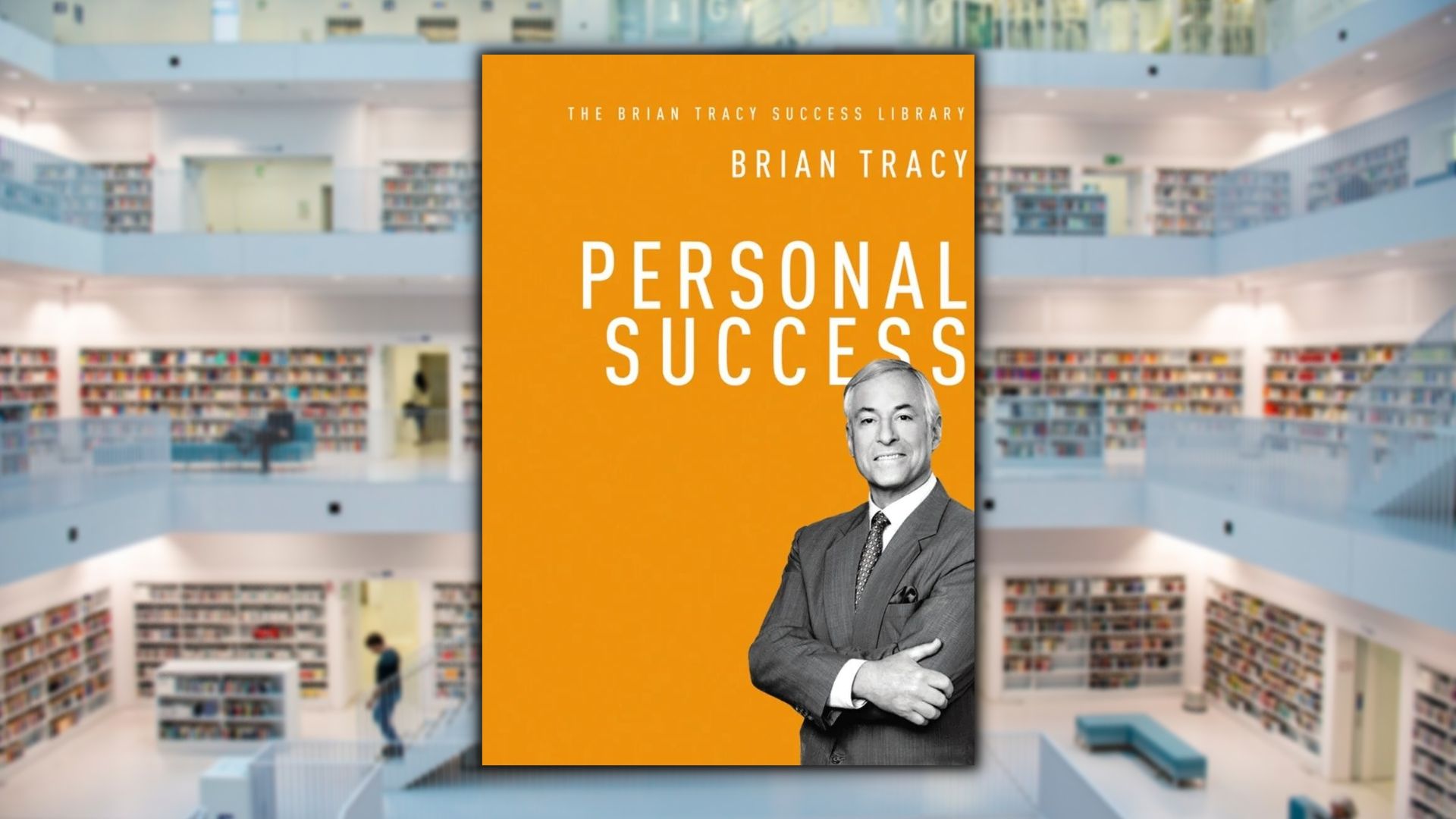
A Sample of My Book Notes from Personal Success:
“You can have almost anything you want in life, but first you have to decide what it is.”
“Small, marginal differences in competence in vital areas can translate into enormous differences in results. This concept also states that small weaknesses in critical areas can, in themselves, be sufficient to keep individuals at low levels of achievement and income, year after year, whether or not they are aware of those weaknesses.”
“Do something every day on your most important goal. Do something seven days a week, thirty days a month. Never let a day go by where you don’t do something that moves you at least one step forward toward something that is important to you.”
“Keep making the decision to go forward until it becomes so automatic that you don’t back away from anything.”
“Be careful never to say anything about yourself that you do not want to be true.”
“The more you do of what you’re doing, the more you get of what you’ve got.”
Further Reading: Matt Karamazov's Notes from 1,200+ Books
What's Next?

That's it for this issue! But I'll be back next time with more book breakdowns, inspiring thinkers, novel concepts, big ideas, reading tips, and more.
In the next issue, I will also be releasing the breakdown of The Little Black Book of Workout Motivation, by Mike Matthews, an uplifting, encouraging, and science-backed book that will make you feel good about going to the gym, and will also help you get there in the first place.
Also, if you have any bookish friends that you think would love the Stairway to Wisdom, you can click the button below and share it with them. I mean, what are friends for?
We covered a lot today, and again, thank you very much for joining the Stairway to Wisdom. The whole team is behind you! We all want you to win!
Until next time...and happy reading!
Matt Karamazov
